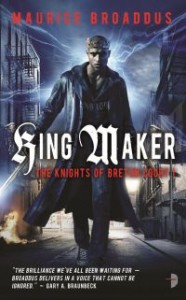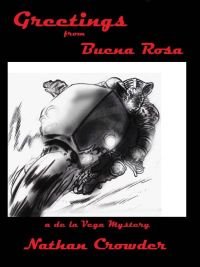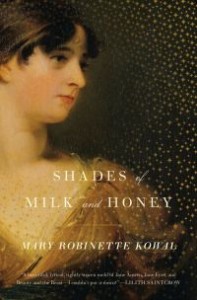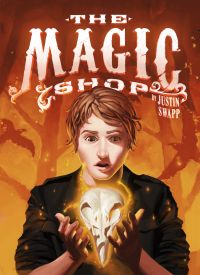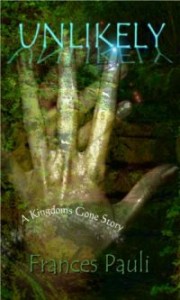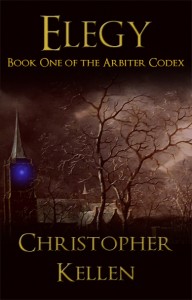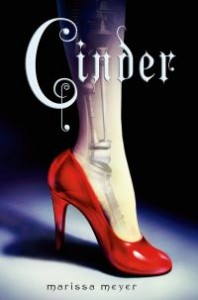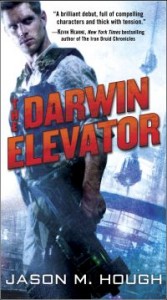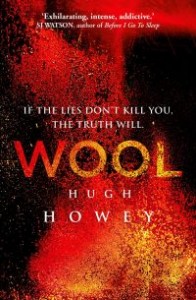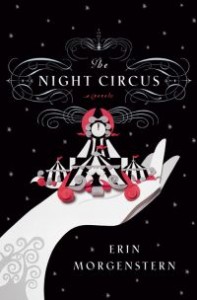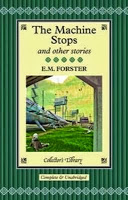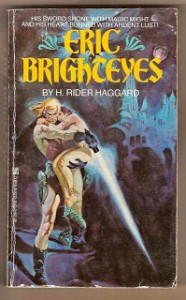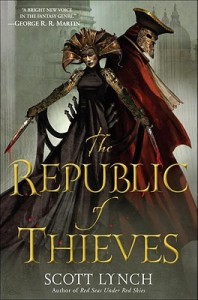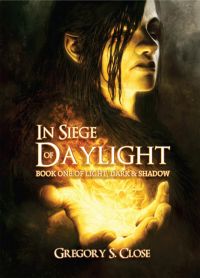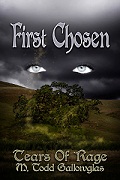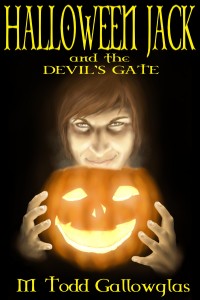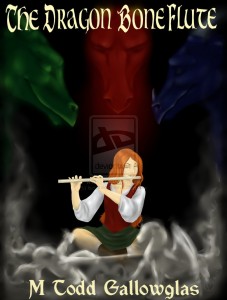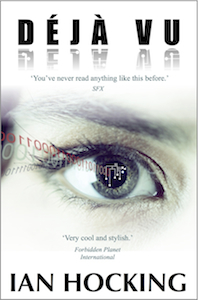Understanding why some SF/F/H novels become massively popular while others languish in obscurity is an exercise in futility. For whatever reason, some books simply never get the right combo of marketing support, reader buzz, and magical-mass-market-mojo to become popular. Other books have moments of critical and popular success only to fade into obscurity over time. It’s no surprise then that there are dozens—if not hundreds or thousands—of SF/F/H gems that are largely unheard of and unread by modern readers. In an effort to unearth some of these gems I invited fourteen authors to recommend their favorite obscure spec-fic novels. Along with my own recommendation, we’ve dug up over twenty novels for readers to go out and discover. Enjoy!
-G. Calcaterra
“The Machine Stops” by E.M. Forster
-Recommended by Garrett Calcaterra, author of Dreamwielder
Brave New World, Ninteen Eighty-Four, and Yevgeny Zamyatin’s We always get credit for being the grand-daddies of dystopian fiction, but E.M. Forster’s novelette “The Machine Stops” predates all of them. First published in 1909, it is a stark warning tale of what could happen when humans become too reliant on technology. It seems more prescient than ever in today’s era of dependency on smart phones, GPS navigation, and auto-correct. “The Machine Stops” is not entirely obscure, having been included in Volume 2B of the Science Fiction Hall of Fame anthology (1973), but few people know about it today. Dig up the Hall of Fame anthology, the Penguin collection of Forster’s Selected Stories, or find the story free online, thanks to it being in the public domain.
Earth Giant (1961) by Edison Marshall
-Recommended by Howard Andrew Jones, author of the Arabian historical fantasies The Desert of Souls and The Bones of the Old Ones
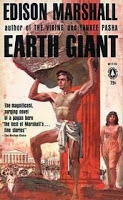 Not only have I never met anyone who’s read this, I’ve never met anyone who’s even heard of the novel. Labeling Earth Giant fantasy is a little bit of a stretch, for there are only two minor magical moments in the entire book. But then it’s not exactly a straight historical novel, either, as only mythical figures appear within its pages. Instead, it’s the best depiction I’ve ever read of one of mankind’s most famous heroes, Herakles. The stirring exploits depicted within this novel might very well have been those that gave birth to the legends that have come down to us. Sure, the cover of Earth Giant makes it look like one of those 50s/60s historical potboilers where much is promised but very little really happens, but Marshall delivers. Not only are there great story arcs and surprises, but Herakles himself is an incredibly likeable character, far different from his more common brash or even arrogant depictions. Any heroic fantasy lovers really owe it to themselves to track it down.
Not only have I never met anyone who’s read this, I’ve never met anyone who’s even heard of the novel. Labeling Earth Giant fantasy is a little bit of a stretch, for there are only two minor magical moments in the entire book. But then it’s not exactly a straight historical novel, either, as only mythical figures appear within its pages. Instead, it’s the best depiction I’ve ever read of one of mankind’s most famous heroes, Herakles. The stirring exploits depicted within this novel might very well have been those that gave birth to the legends that have come down to us. Sure, the cover of Earth Giant makes it look like one of those 50s/60s historical potboilers where much is promised but very little really happens, but Marshall delivers. Not only are there great story arcs and surprises, but Herakles himself is an incredibly likeable character, far different from his more common brash or even arrogant depictions. Any heroic fantasy lovers really owe it to themselves to track it down.
She and Eric Brighteyes by H. Rider Haggard
-Recommended by CJ Cherryh, Hugo and Locus Award winning author
She is associated with the Allan Quatermain stories: “She Who Must Be Obeyed” is an eternal queen. I was also enchanted with the valiant Umslopogaas, the Zulu warrior… Eric Brighteyes is a Viking romance. I loved the images.
A Portrait of Jennie by Robert Nathan
-Recommended by Tim Powers, World Fantasy Award winning author
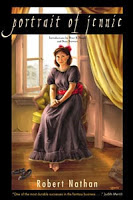 It’s about a Depression-era painter who meets a little girl in a park—she’s all by herself, and dressed in last-century clothes, and speaks very intelligently; he goes home and does a portrait of her from memory, and he meets her again, several times, over the years, but she is each time older than the intervening time could explain, and she talks about old events as if they’re current. It’s all very melancholy, really, but a very haunting book. I see Tachyon Publications has brought it back into print, but I bet nobody’s heard of it anyway.
It’s about a Depression-era painter who meets a little girl in a park—she’s all by herself, and dressed in last-century clothes, and speaks very intelligently; he goes home and does a portrait of her from memory, and he meets her again, several times, over the years, but she is each time older than the intervening time could explain, and she talks about old events as if they’re current. It’s all very melancholy, really, but a very haunting book. I see Tachyon Publications has brought it back into print, but I bet nobody’s heard of it anyway.
The Art of Arrow Cutting by Stephen Dedman
-Recommended by Misty Massey, author of the fantasy novel Mad Kestrel
 Michelangelo `Mage’ Magistrale meets a beautiful woman in need of bus fare. In exchange for the money, she gives him a key on a fob made of hair. Mage thinks he’s seen the last of her, but suddenly he’s dealing with crime bosses, deadly ninjas, bakemono and forgetful gods who all seem dangerously interested in the key in his pocket. Dedman’s novel blends Japanese mythology and contemporary fantasy with the wonderfully dark images of classic noir fiction in a nonstop chase through an LA you never imagined. The book is out of print these days, but you can find copies on Amazon or through used book stores. It’s worth the effort.
Michelangelo `Mage’ Magistrale meets a beautiful woman in need of bus fare. In exchange for the money, she gives him a key on a fob made of hair. Mage thinks he’s seen the last of her, but suddenly he’s dealing with crime bosses, deadly ninjas, bakemono and forgetful gods who all seem dangerously interested in the key in his pocket. Dedman’s novel blends Japanese mythology and contemporary fantasy with the wonderfully dark images of classic noir fiction in a nonstop chase through an LA you never imagined. The book is out of print these days, but you can find copies on Amazon or through used book stores. It’s worth the effort.
Od Magic by Patricia A. McKillip
-Recommended by Mary C. Moore, managing editor at Reputation Books and author of the science fiction novel, Angelus
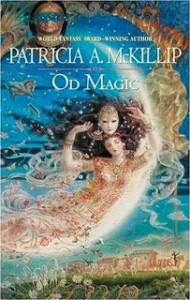 Fantasy writers often lose something when they become linked to a publishing house. They begin to churn out pale versions of their original works for the sake of more sales, whether it be under pressure of their publishers/agents or for their own gain. It is, unfortunately, not a surprise to a fan/reader when they pick up a newer book by their favorite fantasy author and find they are somewhat disappointed. Sure they get a satisfactory read, but there is something missing, that lovely warm feeling that had filled them when they read that author’s first book. Mercedes Lackey, Anne Rice, even the great Anne McCaffrey or Andre Norton are all culpable of this. Now before you rage, “how dare you!” at me, know that I love each and every one of those authors. They broke down barriers for women genre writers everywhere. They are the grand dames of fantasy and science fiction. They are great writers. But you have to admit, their writing has not, (or did not) evolve/mature very much over their long illustrious careers.
Fantasy writers often lose something when they become linked to a publishing house. They begin to churn out pale versions of their original works for the sake of more sales, whether it be under pressure of their publishers/agents or for their own gain. It is, unfortunately, not a surprise to a fan/reader when they pick up a newer book by their favorite fantasy author and find they are somewhat disappointed. Sure they get a satisfactory read, but there is something missing, that lovely warm feeling that had filled them when they read that author’s first book. Mercedes Lackey, Anne Rice, even the great Anne McCaffrey or Andre Norton are all culpable of this. Now before you rage, “how dare you!” at me, know that I love each and every one of those authors. They broke down barriers for women genre writers everywhere. They are the grand dames of fantasy and science fiction. They are great writers. But you have to admit, their writing has not, (or did not) evolve/mature very much over their long illustrious careers.
This is not the case of Patricia McKillip. Although McKillip is perhaps best known for her Riddle Master series or The Forgotten Beasts of Eld, both of which were published in the seventies, her later work is where she really starts to shine. Her prose has a lyrical quality to it that is hard to match, and her stories are both wonderfully spiritual and utterly magical. Od Magic, published in 2005—nearly 20 years after her first—is a true testament to an author who has matured in time. You would be hard pressed to find another fantasy novel that captures such earthly beauty and emotion wrapped up in floating specks of magical dust.
Illumination by Terry McGarry
-Recommended by D.B. Jackson/David B. Coe, author of the historical urban fantasies, Thieftaker and Thieves’ Quarry
 About a dozen years ago, big fat fantasies (BFFs) were all the rage. Big names and small (including me, writing as David B. Coe) were putting out epic fantasies, set in imagined worlds, arranged in multi-volume story-arcs. Many of them were good. A few were outstanding. And, unfortunately, some of the very best fell through the cracks of the commercial market. In 2001, Terry McGarry, who is a friend (not to mention an outstanding copyeditor) came out with Illumination, the first book in a trilogy that also included The Binder’s Road and Triad. The Illumination trilogy, as it came to be known, remains one of the finest fantasies I’ve ever read. Terry’s prose is gorgeous; her characters are unusual, fascinating, drawn with subtlety and exquisite detail; her setting is real and gritty and expertly imagined; her storylines are like barbed hooks—once they’ve got hold of you, they don’t let go. These books deserved far more attention and marketplace success than they received. They should be on the shelves of any serious fan of fantasy.
About a dozen years ago, big fat fantasies (BFFs) were all the rage. Big names and small (including me, writing as David B. Coe) were putting out epic fantasies, set in imagined worlds, arranged in multi-volume story-arcs. Many of them were good. A few were outstanding. And, unfortunately, some of the very best fell through the cracks of the commercial market. In 2001, Terry McGarry, who is a friend (not to mention an outstanding copyeditor) came out with Illumination, the first book in a trilogy that also included The Binder’s Road and Triad. The Illumination trilogy, as it came to be known, remains one of the finest fantasies I’ve ever read. Terry’s prose is gorgeous; her characters are unusual, fascinating, drawn with subtlety and exquisite detail; her setting is real and gritty and expertly imagined; her storylines are like barbed hooks—once they’ve got hold of you, they don’t let go. These books deserved far more attention and marketplace success than they received. They should be on the shelves of any serious fan of fantasy.
The Reckoning by Ruby Jean Jensen
-Recommended by Brian Barnett, author of the middle-grade chapter book, Graveyard Scavenger Hunt
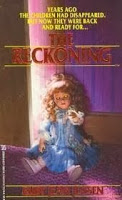 Whenever the opportunity arises for readers to list their favorite horror authors, lists are often short, yet relatively diverse, with a core rotation of names you’ve almost certainly heard of. I’d almost guarantee one name you’ll never find on those lists is Ruby Jean Jensen. It’s a shame, really. She was a talented author who usually relied on ghostly children as the catalysts of terror. The Reckoning was one of many novels in her long career, but it was the first of hers I read and will likely remain my favorite. During the peak her career, she was overshadowed by the likes of rock-star bestsellers Stephen King, Clive Barker, Dean Koontz, Robert McCammon and Ramsey Campbell. Though she never got the recognition of those masters, she knew how to bring the horror just the same. One can occasionally find a Jensen novel in used bookstores or online.
Whenever the opportunity arises for readers to list their favorite horror authors, lists are often short, yet relatively diverse, with a core rotation of names you’ve almost certainly heard of. I’d almost guarantee one name you’ll never find on those lists is Ruby Jean Jensen. It’s a shame, really. She was a talented author who usually relied on ghostly children as the catalysts of terror. The Reckoning was one of many novels in her long career, but it was the first of hers I read and will likely remain my favorite. During the peak her career, she was overshadowed by the likes of rock-star bestsellers Stephen King, Clive Barker, Dean Koontz, Robert McCammon and Ramsey Campbell. Though she never got the recognition of those masters, she knew how to bring the horror just the same. One can occasionally find a Jensen novel in used bookstores or online.
The Last City by Nina D’Aleo
Recommended by Ahimsa Kerp, co-author of the mosaic novel, The Roads to Baldairn Motte
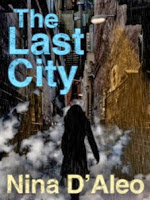 It’s billed as Bladerunner meets Perdido Street Station, but it’s far closer to Miéville than Dick. The ridiculous levels of creativity are the most noticeable strengths, but there are a great many things gone right. The prose is excellent. The intriguing plot is convincing without ever seeming contrived. But like Mieville (and unlike Dick) this is a book of fascinating characters. Moral, immoral, and amoral alike mix in the mean streets, and while I don’t usually have favorite POV, Eli the imp-breed is sheer genius. He stands out as a great character as much as Tyrion Lannister did in the late 90’s.
It’s billed as Bladerunner meets Perdido Street Station, but it’s far closer to Miéville than Dick. The ridiculous levels of creativity are the most noticeable strengths, but there are a great many things gone right. The prose is excellent. The intriguing plot is convincing without ever seeming contrived. But like Mieville (and unlike Dick) this is a book of fascinating characters. Moral, immoral, and amoral alike mix in the mean streets, and while I don’t usually have favorite POV, Eli the imp-breed is sheer genius. He stands out as a great character as much as Tyrion Lannister did in the late 90’s.
Superfolks by Robert Mayer
-Recommended by James Aquilone, writer and editor
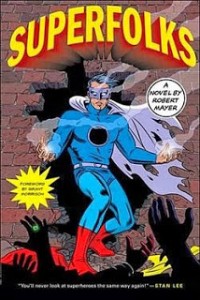 While Alan Moore gets most of the credit when it comes to creating the modern, deconstructed superhero, it really began with a novel called Superfolks. Published in 1977, Robert Mayer’s first book satirizes and updates such superheroes as Superman and Captain Marvel. This is how the publisher describes the story: “David Brinkley used to be a hero, the greatest the world had ever seen—until he retired, got married, moved to the suburbs, and packed on a few extra pounds. Now all the heroes are dead or missing, and his beloved New York is on the edge of chaos. It’s up to Brinkley to come to the rescue, but he’s in the midst of a serious mid-life crisis—his superpowers are failing him.” Sound familiar? That’s because Superfolks inspired such comic books and movies as Watchmen, Miracleman, and The Incredibles. Still, few people outside comic book geekdom have even heard of Superfolks. Perhaps that’s because of its many corny, dated jokes. (David Brinkley, really?) Besides Alan Moore, Neil Gaiman, Kurt Busiek, and Grant Morrison having drawn inspiration from the novel, it’s a must-read for the true superhero aficionado.
While Alan Moore gets most of the credit when it comes to creating the modern, deconstructed superhero, it really began with a novel called Superfolks. Published in 1977, Robert Mayer’s first book satirizes and updates such superheroes as Superman and Captain Marvel. This is how the publisher describes the story: “David Brinkley used to be a hero, the greatest the world had ever seen—until he retired, got married, moved to the suburbs, and packed on a few extra pounds. Now all the heroes are dead or missing, and his beloved New York is on the edge of chaos. It’s up to Brinkley to come to the rescue, but he’s in the midst of a serious mid-life crisis—his superpowers are failing him.” Sound familiar? That’s because Superfolks inspired such comic books and movies as Watchmen, Miracleman, and The Incredibles. Still, few people outside comic book geekdom have even heard of Superfolks. Perhaps that’s because of its many corny, dated jokes. (David Brinkley, really?) Besides Alan Moore, Neil Gaiman, Kurt Busiek, and Grant Morrison having drawn inspiration from the novel, it’s a must-read for the true superhero aficionado.
Titus Groan, Gormenghast, and Titus Alone by Mervyn Peake
-Recommended by Luna Lindsey, author of the urban fantasy novel, Emerald City Dreamer
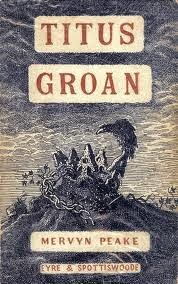 The Gormenghast trilogy received varying levels of attention over the decades, but it is now nearly forgotten among fantasy lovers. First published in 1946, Titus Groan straddles the edge between fantasy and gothic literature, weaving a thin thread of story through a parade of darkly quirky characters in precarious situations amid gorgeous and mysterious architecture described with the kind of playful wordcraft impossible to find anywhere today. I found myself underlining passages which I sometimes go back to reread. Unlike modern fiction, there is no main point of view character, and not even a protagonist, per se. Instead you are offered a cast of deeply flawed caricatures, some you like more (or hate less) than others. Indeed, the central character is the castle, Gormenghast itself, ever looming, almost unaware of the bizarre deplorable events playing out in its hallways. This series manages to be simultaneously clever, funny, and grim, and it deserves your attention. All three titles are still in print, available in a single volume.
The Gormenghast trilogy received varying levels of attention over the decades, but it is now nearly forgotten among fantasy lovers. First published in 1946, Titus Groan straddles the edge between fantasy and gothic literature, weaving a thin thread of story through a parade of darkly quirky characters in precarious situations amid gorgeous and mysterious architecture described with the kind of playful wordcraft impossible to find anywhere today. I found myself underlining passages which I sometimes go back to reread. Unlike modern fiction, there is no main point of view character, and not even a protagonist, per se. Instead you are offered a cast of deeply flawed caricatures, some you like more (or hate less) than others. Indeed, the central character is the castle, Gormenghast itself, ever looming, almost unaware of the bizarre deplorable events playing out in its hallways. This series manages to be simultaneously clever, funny, and grim, and it deserves your attention. All three titles are still in print, available in a single volume.
The Bone Doll’s Twin by Lynn Flewelling
-Recommended by Craig Comer, co-author of The Roads to Baldairn Motte
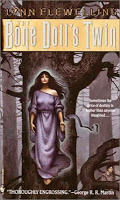 Parents can be hard on their children. For Tobin this means being transformed into a boy and sheltered in a remote castle haunted by the ghost of her slain twin brother—a brother murdered by their parents at birth. To say she got a rough deal is an understatement, even without the wizards and warlords trying to hunt her down. Published in 2001, this coming-of-age tale is the first in a trilogy that questions identity, sacrifice, and the terrible things done in the name of Good. Flewelling is better known for her Nightrunner books, but the Tamir Triad is a tightly written series full of twists on classic fantasy troupes. It is both familiar and unique, a combination that hooks you in and keeps you guessing the whole way through.
Parents can be hard on their children. For Tobin this means being transformed into a boy and sheltered in a remote castle haunted by the ghost of her slain twin brother—a brother murdered by their parents at birth. To say she got a rough deal is an understatement, even without the wizards and warlords trying to hunt her down. Published in 2001, this coming-of-age tale is the first in a trilogy that questions identity, sacrifice, and the terrible things done in the name of Good. Flewelling is better known for her Nightrunner books, but the Tamir Triad is a tightly written series full of twists on classic fantasy troupes. It is both familiar and unique, a combination that hooks you in and keeps you guessing the whole way through.
Lord Darcy, the 2002 omnibus edition, by Randall Garrett (edited by Eric Flint)
-Recommended by Wendy Wagner, author of Skinwalkers
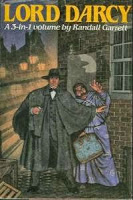 Lord Darcy is a detective living in an alternate history that diverged from ours in that King John never took the throne, and the Angevin Empire covers most of Europe and North America. There is magic, but the emphasis of all the Darcy stories, which are collected in this edition along with the only Randall Garrett Lord Darcy novel, Too Many Magicians, is on solving mysteries. I adore mysteries of all kinds, and the setting is a gem. These stories were originally published in the 60s and 70s, but they still feel fresh and fun.
Lord Darcy is a detective living in an alternate history that diverged from ours in that King John never took the throne, and the Angevin Empire covers most of Europe and North America. There is magic, but the emphasis of all the Darcy stories, which are collected in this edition along with the only Randall Garrett Lord Darcy novel, Too Many Magicians, is on solving mysteries. I adore mysteries of all kinds, and the setting is a gem. These stories were originally published in the 60s and 70s, but they still feel fresh and fun.
Another Day, Another Dungeon by Greg Costikyan and The Hero Always Wins by Robert Eaton
-Recommended by M Todd Gallowglas, author of Judge of Dooms
Fantasy is my biggest love in reading. I’ve been reading fantasy for the better part of four decades, and that’s a lot of books. I first fell in love with Tolkien and Lewis, then moved on to Brooks and Eddings. I’ve read widely across the genre, soaking up the good, the bad, and the weird. One of the things I love most is when a book really surprises me by twisting some expectation of something considered a trope of the fantasy genre. To that, I have two suggestions for books that I had a lot of fun reading.
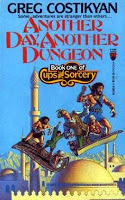 The first is Another Day, Another Dungeon by Greg Costikyan. So often in various publishing market’s submission guidelines, I’ve seen something like, “Don’t give us your D&D adventures.” Few people have the talent to handle a dungeon crawl and make it entertaining. ADAD takes the tropes of early dungeon crawling and ratchets them up to a level of satire that is epic beyond epic. Thieves, barbarian, a cleric to the god of beer, fire mages who can’t seem to understand that other people aren’t immune to fire, and an eleven foot pole (because there are things you wouldn’t want to touch with a ten foot pole). This book is pure, silly fun in a story well told of delving into the dungeon, grabbing the treasure, and then trying to keep the treasure. If you’ve ever played an old-fashioned dungeon crawl, find this book, read it, snicker, giggle, and relive the memories of your misspent gaming youth.
The first is Another Day, Another Dungeon by Greg Costikyan. So often in various publishing market’s submission guidelines, I’ve seen something like, “Don’t give us your D&D adventures.” Few people have the talent to handle a dungeon crawl and make it entertaining. ADAD takes the tropes of early dungeon crawling and ratchets them up to a level of satire that is epic beyond epic. Thieves, barbarian, a cleric to the god of beer, fire mages who can’t seem to understand that other people aren’t immune to fire, and an eleven foot pole (because there are things you wouldn’t want to touch with a ten foot pole). This book is pure, silly fun in a story well told of delving into the dungeon, grabbing the treasure, and then trying to keep the treasure. If you’ve ever played an old-fashioned dungeon crawl, find this book, read it, snicker, giggle, and relive the memories of your misspent gaming youth.
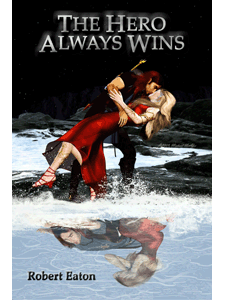 The next book is The Hero Always Wins, by Robert Eaton. Don’t let the title fool you. This book is anything but cliche. It’s rare that a book has me blinking at the pages, or at my Kindle, thinking, “What the hell just happened there?” Especially after a certain wedding in a certain George RR Martin book. Robert Eaton plays on our expectations of fantasy tropes we’ve come to rely on, sticks those in our guts, and twists them like a freezing cold knife. The best part, he sets it up carefully, so that in hindsight, everything fits nicely together. Every twist and turn is foreshadowed with a subtle grace that many writers across all genres take years and dozens books to master. The Hero Always Wins is fun, shocking, and nothing short of awesome. The careful reader might be able to pick out the first big plot twist, but I’d put money they wouldn’t be able to figure out the second, third, or fourth.
The next book is The Hero Always Wins, by Robert Eaton. Don’t let the title fool you. This book is anything but cliche. It’s rare that a book has me blinking at the pages, or at my Kindle, thinking, “What the hell just happened there?” Especially after a certain wedding in a certain George RR Martin book. Robert Eaton plays on our expectations of fantasy tropes we’ve come to rely on, sticks those in our guts, and twists them like a freezing cold knife. The best part, he sets it up carefully, so that in hindsight, everything fits nicely together. Every twist and turn is foreshadowed with a subtle grace that many writers across all genres take years and dozens books to master. The Hero Always Wins is fun, shocking, and nothing short of awesome. The careful reader might be able to pick out the first big plot twist, but I’d put money they wouldn’t be able to figure out the second, third, or fourth.
Lud in the Mist by Hope Mirlees
-Recommended by James P. Blaylock, World Fantasy Award winning author
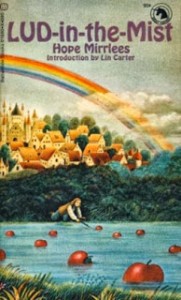 Tim Powers gave me a copy of Lud in the Mist back in the 1970s, assuring me that it was quite likely the best fantasy novel ever written. I think he’s correct. (Neil Gaiman has said something of the same thing recently, and so perhaps all of us are in agreement, and there’s no point in going on here. Even so…) Lud in the Mist was published in 1926, and then again as one of the Ballantine Adult Fantasy series in 1970, this time without permission of the author, who was assumed (conveniently) to have died, although she had not. Upon its original publication, Hope Mirlees was pronounced a genius, and, according to Virginia Woolf, “rather an exquisite apparition.” Mirlees inherited a fortune from her engine-building father and saw it as an opportunity never to have to write again. Too bad for us. She died in 1978, ostensibly never having learned that her novel had been republished. Lud in the Mist evokes Faery and Faeryland in all its dangerous attractions like no other novel, with the exception, perhaps, of MacDonald’s Phantastes.
Tim Powers gave me a copy of Lud in the Mist back in the 1970s, assuring me that it was quite likely the best fantasy novel ever written. I think he’s correct. (Neil Gaiman has said something of the same thing recently, and so perhaps all of us are in agreement, and there’s no point in going on here. Even so…) Lud in the Mist was published in 1926, and then again as one of the Ballantine Adult Fantasy series in 1970, this time without permission of the author, who was assumed (conveniently) to have died, although she had not. Upon its original publication, Hope Mirlees was pronounced a genius, and, according to Virginia Woolf, “rather an exquisite apparition.” Mirlees inherited a fortune from her engine-building father and saw it as an opportunity never to have to write again. Too bad for us. She died in 1978, ostensibly never having learned that her novel had been republished. Lud in the Mist evokes Faery and Faeryland in all its dangerous attractions like no other novel, with the exception, perhaps, of MacDonald’s Phantastes.
(Blaylock’s recommendation was originally published here, along with 9 other obscure fantasy novels he recommends. Reprint of this rec done with his permission. –GC)
See more at: http://garrettcalcaterra.blogspot.com/2013/10/20-obscure-sffh-books-recommended-by.html#sthash.uzoCph60.dpuf
(Originally posted at http://garrettcalcaterra.blogspot.com/2013/10/20-obscure-sffh-books-recommended-by.html)




